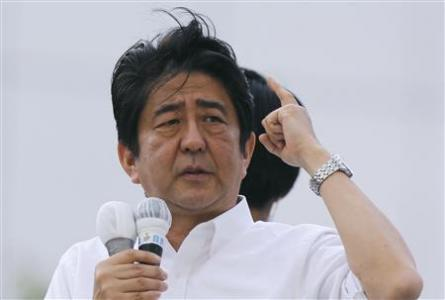Shinzo Abe Targets Corporate Tax Cut After Delivering Sales Tax Hike And A $50B Stimulus Package To Offset Its Impact On Economic Growth

Japanese Prime Minister Shinzo Abe on Tuesday announced a sales tax hike to 8 percent from 5 percent beginning next April in a bid to tackle burgeoning government debt, along with a $50 billion stimulus package to help the nation’s economy cope with the tax hike, and called for a political debate on reducing the corporate tax to boost growth.
"Japan's corporate tax rate is high compared with international standards. This is an issue that needs serious scrutiny in order for Japan to overcome global competition, lure investment from around the world and achieve sustained economic growth," Abe said in the news conference, Reuters reported.
The draft of the stimulus policy, which will be finalized in December, reportedly includes ending a special corporate tax for earthquake reconstruction in April, a year earlier than planned; tax breaks to companies that offer wage hikes, and spending on public works for the 2020 Olympics, among other plans.
The paradoxical policy of a tax hike and stimulus, which drew criticism as well as praise from economists and businesses, is expected to curb Japan’s huge public debt in the long run while supporting economic growth in the short term.
The tax hike, the first major fiscal reform since 1997, is part of a two-phase plan, adopted by the previous government to double the tax rate by 2015 in order to curtail government borrowing, which is almost twice the size of its gross domestic product, or GDP. The government expects to collect about 7.5 trillion yen ($75 billion) by raising the national sales tax rate, which is also known as consumption tax, while the economic stimulus will inject about 5 trillion yen, or $50.96 billion, back in to the economy.
Critics point out that the dual policy of raising tax and then ploughing the money back could hurt the world’s third-largest economy, which is witnessing a feeble recovery. They argue that most of the additional tax revenues would be spent on funding the stimulus.
"It's just silly to collect money and then spend it right away to prop up the economy," Keiichiro Asao, a senior lawmaker of the opposition Your Party, said in an interview, the Wall Street Journal reported. "If a tax hike hurts the economy, why do you even bother to do it in the first place?"
However, some economists believe that Abe’s policy could reinvigorate the economy and at the same time save the nation from a debt default in the long run. The tax hike, they argue, is a measure for long-term revenue generation, and it would help withstand costly economic stimulus policies that are much needed to steer the economy out of its decades-long deflation.
"This is very constructive in terms of the assessment of the current economic situation. There is no reason that Abe should stop raising the sales tax," said Masamichi Adachi, senior economist at JPMorgan Securities in Tokyo.
Japan’s economy, aided by Abe’s ultra-loose monetary policies, is slowly inching out of deflation on the back of strong consumer spending, a pickup in overseas demand and increased government investment in public works projects.
The closely-watched Tankan business sentiment survey released by the central bank hours before Abe's press conference showed that sentiment among Japanese manufacturers rose sharply to 12 points in the quarter ended September, up 8 points from the previous quarter. The survey reading, which marked the third-straight quarter of improvement and its highest level since December 2007, was far above analysts’ forecast of a reading of 7 points.
Abe and the central bank consider the benchmark survey’s outcome in making policy decisions, and the better-than-expected sentiment is seen as a clear indication that Japan’s economy is moving in the right direction.
The Nikkei 225 stock index rallied more than 1 percent in intraday trade after Abe's remarks about the sales tax hike and the stimulus policy, before losing ground to end the day up 0.2 percent.
© Copyright IBTimes 2024. All rights reserved.




















